| Downing College | |
|---|---|
| University of Cambridge | |
 Downing College Chapel Downing College Chapel | |
 Arms of Downing College Arms of Downing CollegeArms: Barry of eight argent and vert, a griffin segreant or within a bordure azure charged with eight roses of the first seeded and barbed proper. | |
| Scarf colours: black, with three narrow magenta stripes | |
| Location | Regent Street, Cambridge (map) |
| Coordinates | 52°12′03″N 0°07′29″E / 52.2008°N 0.1248°E / 52.2008; 0.1248 |
| Full name | Downing College in the University of Cambridge |
| Abbreviation | DOW |
| Motto | Quaerere Verum (Latin) |
| Motto in English | Seek the truth |
| Founder | Sir George Downing |
| Established | 22 September 1800; 224 years ago (22 September 1800) |
| Sister college | Lincoln College, Oxford |
| Master | Graham Virgo |
| Undergraduates | 493 (2022-23) |
| Postgraduates | 455 (2022-23) |
| Endowment | £70.7m (2022) |
| Visitor | |
| Website | www |
| JCR | www |
| MCR | downingmcr |
| Boat club | www |
| Map | |
  | |
Downing College is a constituent college of the University of Cambridge and currently has around 950 students. Founded in 1800, it was the only college to be added to Cambridge University between 1596 and 1869, and is often described as the oldest of the new colleges and the newest of the old. Downing College was formed "for the encouragement of the study of Law and Medicine and of the cognate subjects of Moral and Natural Science", and has developed a reputation amongst Cambridge colleges for Law and Medicine.
Downing has been named one of the two most eco-friendly Cambridge colleges.
History
Upon the death of Sir George Downing, 3rd Baronet in 1749, the wealth left by his grandfather, Sir George Downing, 1st Baronet, who served both Cromwell and Charles II and built 10 Downing Street (a door formerly from Number 10 is in use in the college), was applied by his will. Under this will, as he had no direct issue (he was legally separated from his wife), the family fortune was left to his cousin, Sir Jacob Downing, 4th Baronet, and if he died without heir, to three cousins in succession. If they all died without issue, the estates were to be used to found a college at Cambridge called Downing.
Sir Jacob died in 1764, and as the other named heirs had also died, the college should have come into existence then, but Sir Jacob's widow, Margaret, refused to give up the estates and the various relatives who were Sir George's legal heirs had to take costly and prolonged action in the Court of Chancery to compel her to do so. She died in 1778 but her second husband and the son of her sister continued to resist the heirs-at-law's action until 1800 when the court decided in favour of Sir George's will and George III granted Downing a royal charter, marking the official foundation of the college.
Buildings

The architect William Wilkins was commissioned by the trustees of the Downing estate, who included the Master of Clare College and St John's College and the Archbishops of Canterbury and York, to design the plan for the college. Wilkins, a disciple of the neo-classical architectural style, designed the first wholly campus-based college plan in the world based on a magnificent entrance on Downing Street reaching back to form the largest court in Cambridge, extending to Lensfield Road. But this was not to be.
The estate was much reduced by the suit in Chancery, and the grand plans failed. Much of the north side of what was then the Pembroke Leys was sold to the university and is now home to scientific buildings ("The Downing Site"). In fact, only limited East and West ranges were initially built, with the plans for a library and chapel on the south face of the college shelved.

The third side of the square was only completed in 1951 with the building of the college chapel. Where the fourth side would have been is now a large paddock (known simply as "The Paddock"), with many trees. Though not fully enclosed, the court formed before the Downing College is perhaps largest in Cambridge or Oxford (a title contested with Trinity College's Great Court). An urban legend amongst Cambridge students claims that Trinity pays an undisclosed sum to the college annually with the condition that it will never build the fourth side of the square, so that Trinity may maintain the distinction of having the largest enclosed court of all colleges of Cambridge.
The most recent building additions are the Howard Lodge accommodation, the Howard Building, and most recent of all the Howard Theatre which opened in 2010. These were sponsored by the Howard Foundation, and are located behind the main court around their own small garden. These facilities are used for conference and businesses gatherings outside the student term.
Heong Gallery
The Heong Gallery, opened in February 2016, is a modern and contemporary art gallery at Downing. It is named for Alwyn Heong, an alumnus of the college, who is a supporter of the visual arts. The conversion of a stables building by Caruso St John won a RIBA regional award.
Student life
Downing students remain prominent in the university world; in the past few years Cambridge Union Presidents, Blues captains, Law and Economic Society Presidents and more have hailed from the college. Downing has a particular reputation for law.
The Griffin has been the undergraduate student magazine for over 100 years.

Sport
The college fields teams in a range of sports including, men's football, men's and women's rugby, tennis and ultimate.
Downing College Boat Club is successful too, with the Women's first boat gaining Lents Headship of the river in 2004 and most recently in 2020, and the Mays Headship in the 2014 and 2015 May Bumps. The men's first boat has held the headship several times in the 1980s and 1990s (for example in 1994 to 1996) while gaining the Mays headship in 1996 and the Lents Headship in 2014, on each occasion recognising the tradition of "burning the boat" (using an old wooden 8 oared boat), while the rowers of the winning boat jump the flames. They both currently hold positions at or near the top in both University bumps races .
Gallery
-
 East Range, Downing College, November 2006
East Range, Downing College, November 2006
-
 The Paddock, the green space between the trees. The church on the skyline is on Lensfield Road.
The Paddock, the green space between the trees. The church on the skyline is on Lensfield Road.
-
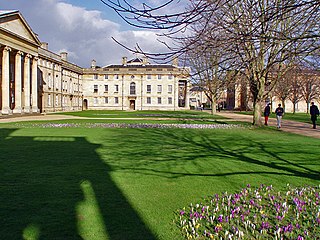 North east view of the lawns outside the chapel.
North east view of the lawns outside the chapel.
-
The Howard Building
-
 J Staircase accommodation
J Staircase accommodation
-
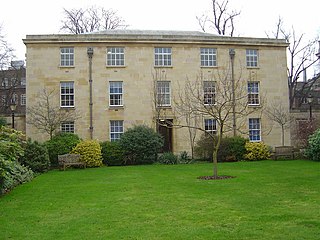 The Kenny Building
The Kenny Building
-
A sundial commemorating the bicentenary of the college
-
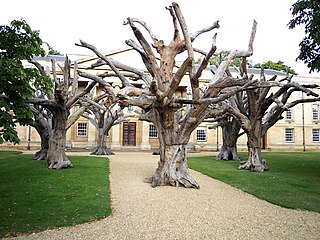 Ai Weiwei Trees, part of a 2016 exhibition at the Heong Gallery
Ai Weiwei Trees, part of a 2016 exhibition at the Heong Gallery
-
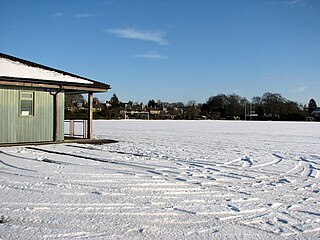 The college sports ground in the snow
The college sports ground in the snow
People associated with Downing
Further information: List of Masters of Downing College, CambridgeThe college is renowned for its strong legal tradition, being built up by Clive Parry, his pupil and successor John Hopkins and Graham Virgo. Legal notables who have been honorary fellows of the college include the late Sir John Smith, the pre-eminent criminal lawyer of his generation; Lord Collins of Mapesbury, the first solicitor to be appointed to the Court of Appeal and House of Lords; and Sir Robert Jennings, former President of the International Court of Justice.
Notable alumni
See also: Category:Alumni of Downing College, Cambridge-
 Aitzaz Ahsan, Pakistani politician
Aitzaz Ahsan, Pakistani politician
-
 John Cleese, actor and comedian
John Cleese, actor and comedian
-
 John Leslie Green, Victoria Cross recipient
John Leslie Green, Victoria Cross recipient
-
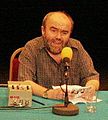 Andy Hamilton, comedian
Andy Hamilton, comedian
-
 Sir Ray Lankester, invertebrate zoologist and evolutionary biologist
Sir Ray Lankester, invertebrate zoologist and evolutionary biologist
-
 Thandiwe Newton, BAFTA award-winning actress
Thandiwe Newton, BAFTA award-winning actress
-
 Remi Fani-Kayode, Nigerian politician
Remi Fani-Kayode, Nigerian politician
-
 Sir John Pendry, theoretical physicist
Sir John Pendry, theoretical physicist
-
 William Philip Schreiner, Prime Minister of the Cape Colony during the Second Boer War
William Philip Schreiner, Prime Minister of the Cape Colony during the Second Boer War
-
 Michael Winner, film director and producer
Michael Winner, film director and producer
-
David Lloyd Jones, Lord Lloyd-Jones, Justice of the Supreme Court of the United Kingdom
-
 Yong Pung How, former Chief Justice of Singapore
Yong Pung How, former Chief Justice of Singapore
- Peter Ackroyd, Biblical scholar
- Michael Apted, TV and film director and producer
- Mike Atherton, England cricket player
- Martin Baker, Master of Music, Westminster Cathedral
- Richard Baker, former CEO of Boots Group
- Richard Barbrook, lecturer at University of Westminster
- Michael Baxandall, art historian
- Farmida Bi, lawyer
- Quentin Blake, author and illustrator
- John Blofeld, Taoist and Buddhist author
- Sir Derek Bowett, international lawyer, former Whewell Professor of International Law
- Giles Brindley, physiologist
- Frank Buttle, priest and founder of two charities
- John Cardy, physicist
- J. C. D. Clark, historian
- John Cleese, actor and comedian of Monty Python fame
- Geoffrey Cox KC, barrister and Conservative MP
- Mark Cox, tennis player
- Lawrence Collins, judge
- Rob Crilly, journalist and author
- Scott Davidson, VC, Professor of Law
- Louise Dean, author
- Terrance Dicks, author, TV writer, script editor, producer
- Sir Bernard Eder, High Court judge
- D. J. Enright, poet
- Arnold Goodman, lawyer
- Hari Singh Gour, lawyer and jurist
- John Leslie Green, VC
- Richard Gregory, experimental psychologist (neuropsychology, visual perception), author of Eye and Brain (1966)
- Nick Griffin, British National Party leader
- Andy Hamilton, comedian, director and critic
- Hildebrand Wolfe Harvey, marine biologist
- Hamish Henderson, Scots poet
- Philip Hobsbaum, poet
- David Holbrook, poet, author, critic
- Yong Pung How, second Chief Justice of Singapore
- Howard Jacobson, novelist
- Stan Kelly-Bootle, pioneer computer scientist
- Martin Kemp, art historian
- Clive King, author
- Ray Lankester, zoologist
- Sir Frank Lee, civil servant, Master of Corpus Christi College
- Sir Kim Lewison, Lord Justice of Appeal
- Godfrey Lienhardt, anthropologist
- Peter Lienhardt, social anthropologist
- David Lister, Origami historian
- Lord David Lloyd Jones, Justice of the Supreme Court of the United Kingdom
- Malcolm MacDonald, writer on music
- Sir Richard McCombe, Lord Justice of Appeal
- Bernard Mayes, journalist, professor and author
- Ed Mayo, economist
- Wilfrid Mellers, music critic and composer
- Karl Miller, literary editor, critic and writer
- Mark Moore, headmaster Clifton College
- George Mosse, historian
- Henry Naylor, comedian and playwright
- Michael Neubert, British politician
- Thandiwe Newton, actress
- Trevor Nunn, theatre and film director
- Iain Overton, investigative journalist
- Tim Parks, novelist, university professor, translator
- Kathryn Parsons, British tech entrepreneur, co-founder of Decoded
- Gordon Pask, cybernetician
- Stuart Peach, Air Chief Marshal and Chairman of the NATO Military Committee
- John Pendry, theoretical physicist
- John Penrose, politician
- E.O.E. Pereira, engineer
- Rubel Phillips, lawyer and politician from Mississippi
- Justin Pollard, historian, writer
- Victoria Prentis KC, Attorney General and Conservative MP
- Amol Rajan, former editor, The Independent journalist, broadcaster
- Brian Redhead, author, journalist, broadcaster
- Gordon Reece, journalist, TV producer, political strategist
- Derek Robinson, novelist, rugby official
- Graham Savage, Education Officer for London County Council, influential advocate for comprehensive schools
- William Schreiner, Prime Minister of the Cape Colony during the South African War
- Francis Terry, classicist and architect
- John Treherne, Entomologist and author
- Dorothy Trump, geneticist
- Leigh Turner, diplomat
- Tom Udall, United States Senator from New Mexico
- Rumi Verjee, businessman and philanthropist
- Annabel Vernon, world rowing champion
- Lord Wallace of Tankerness, lawyer and politician; former Deputy First Minister of Scotland
- Arthur Watts, international lawyer, diplomat and arbitrator
- Richard Weber, mathematician
- Philip William Wheeldon, Bishop of Whitby and Bishop of Kimberley and Kuruman
- Caroline Wilson, diplomat
- Michael Winner, film director and producer, restaurant critic
Fellows
Main category: Fellows of Downing College, CambridgeReferences
- University of Cambridge (6 March 2019). "Notice by the Editor". Cambridge University Reporter. 149 (Special No 5): 1. Retrieved 20 March 2019.
- "Downing welcomes Professor Graham Virgo KC (Hon) as the 19th Master". Downing College Cambridge. 2 October 2023. Retrieved 6 October 2023.
- "Annual report and Accounts for the year ended 30 June 2022" (PDF). Downing College, Cambridge. Retrieved 26 May 2023.
- Cite error: The named reference
dow-cam-statuteswas invoked but never defined (see the help page). - Walker, Timea (2 February 2022). "Downing College". www.undergraduate.study.cam.ac.uk. Retrieved 2 November 2022.
- "Downing College". University of Cambridge. Retrieved 2 September 2010.
- Chappell, Peter (16 September 2018). "How a small society of Indian Cambridge students helped destroy the British Raj". Varsity. Retrieved 18 September 2018.
Downing admitted one third of all Indian students as the College's heavy focus on Law drew many applications from the Empire.
- "Jesus and Downing named 'greenest' Cambridge colleges". 30 April 2012.
- "Quinlan Francis Terry Architects". Archived from the original on 7 April 2014. Retrieved 13 September 2014.
- "Downing College Conferences & Functions, Cambridge". Downing-conferences-cambridge.co.uk. Retrieved 15 May 2014.
- "Heong Gallery, Downing College". Retrieved 23 May 2017.
- "Previous Campaigns – the Hopkins Parry Fellowship".
- FaceJolt. "The Griffin". Archived from the original on 11 October 2015. Retrieved 13 September 2014.
- Bowler, Peter J., ed. (2004). "Lankester, Sir (Edwin) Ray (1847–1929)". Oxford Dictionary of National Biography. Oxford University Press.
- "Rubel Phillips Obituary: View Rubel Phillips's Obituary by Clarion Ledger". Legacy.com. Retrieved 19 December 2011.
- "Amol Rajan". Archived from the original on 19 August 2014. Retrieved 13 September 2014.
- Josh Halliday "Amol Rajan appointed as Independent editor", The Guardian, 17 June 2013
Bibliography
- Bradley, Simon; Pevsner, Nikolaus (2014). Buildings of England: Cambridgeshire. Pevsner Architectural Guides. New Haven: Yale University Press. ISBN 978-0-300-20596-1.
- French, Stanley, ed. (1982). Aspects of Downing History. Cambridge: Downing College Association. OCLC 13078974.
- Hope, Thomas (1804). Observations on the Plans and Elevations Designed by James Wyatt, Architect, for Downing College, Cambridge: In a Letter to Francis Annesley, Esq. M. P. London: D.N. Shury. OCLC 61617898.
- Liscombe, Rhodri Windsor (1980). William Wilkins, 1778–1839. Cambridge: Cambridge University Press. ISBN 978-0-521-22528-1.
- Stevens, Horace William Pettit (1889). Downing College. London: F.E. Robinson. OCLC 18275839.
- Rawle, Tim (2015). Adamson, John (ed.). A Classical Adventure: The Architectural History of Downing College, Cambridge. Photography by Tim Rawle and Louis Sinclair. Cambridge: The Oxbridge Portfolio. ISBN 978-0-9572867-4-0.
- Smith, Otto Saumarez (2013). "A Strange Brutalist 'Primitive Hut': Howell, Killick, Partridge and Amis's Senior Combination Room at Downing College, Cambridge". Twentieth Century Architecture (Oxford and Cambridge: No. 11). The Twentieth Century Society: 148–165. JSTOR 24644446.
- Sicca, Cinzia Maria (1987). Committed to Classicism: The Building of Downing College, Cambridge. Contributions by Charles Harpum and Edward Powell. Photography, design, and production by Tim Rawle. Cambridge: Downing College. ISBN 978-0-9511620-1-9.
- Watkin, David (2000). The Age of Wilkins: The Architecture of Improvement. Cambridge: Fitzwilliam Museum. ISBN 978-0-9538462-0-7.
- Watkin, David (2004). The Architect King: George III and the Culture of the Enlightenment. London: Royal Collection Publications. ISBN 978-1-902163-50-5.
- Watkin, David (2006). Radical Classicism: The Architecture of Quinlan Terry. New York: Rizzoli. ISBN 978-0-8478-2806-7.
- Watkin, David (2015). The Practice of Classical Architecture: The Architecture of Quinlan and Francis Terry, 2005-2015. Foreword by Charles, Prince of Wales. New York: Rizzoli. ISBN 978-0-8478-4490-6.
- Willis, Robert; Clark, John Willis (1886). The Architectural History of the University of Cambridge and of the Colleges of Cambridge and Eton. Vol. 1–4. Cambridge: Cambridge University Press.
External links
- Downing College website
- Downing JCR (Junior Combination Room) website
- Downing MCR (Middle Combination Room) website Archived 3 March 2019 at the Wayback Machine
- Downing College Alumni Association website
| Downing College, Cambridge | |||
|---|---|---|---|
 |
|  | |
- Downing College, Cambridge (11 March 2020). "Statutes" (PDF). dow.cam.ac.uk. Archived (PDF) from the original on 20 October 2022. Retrieved 20 October 2022.
